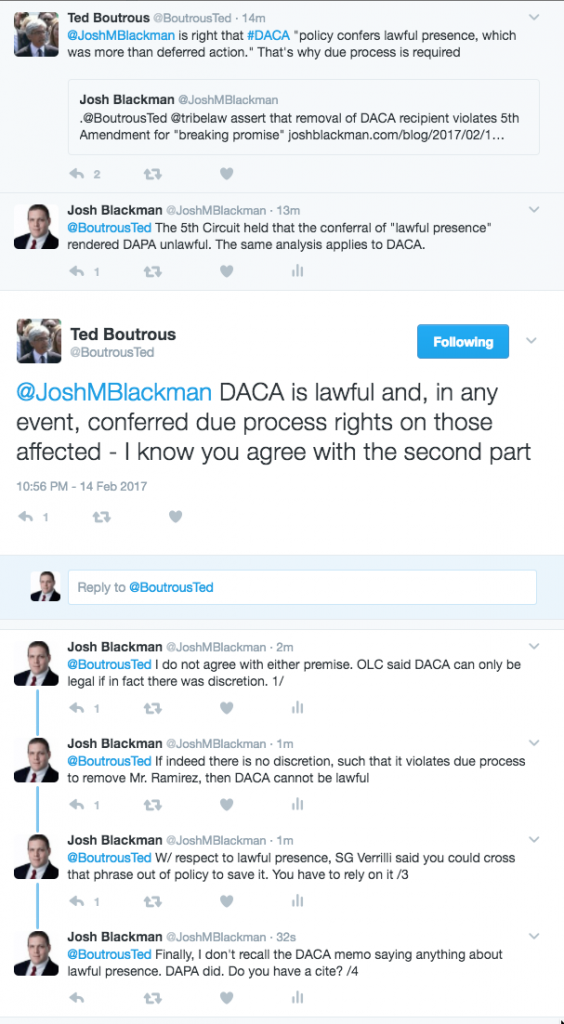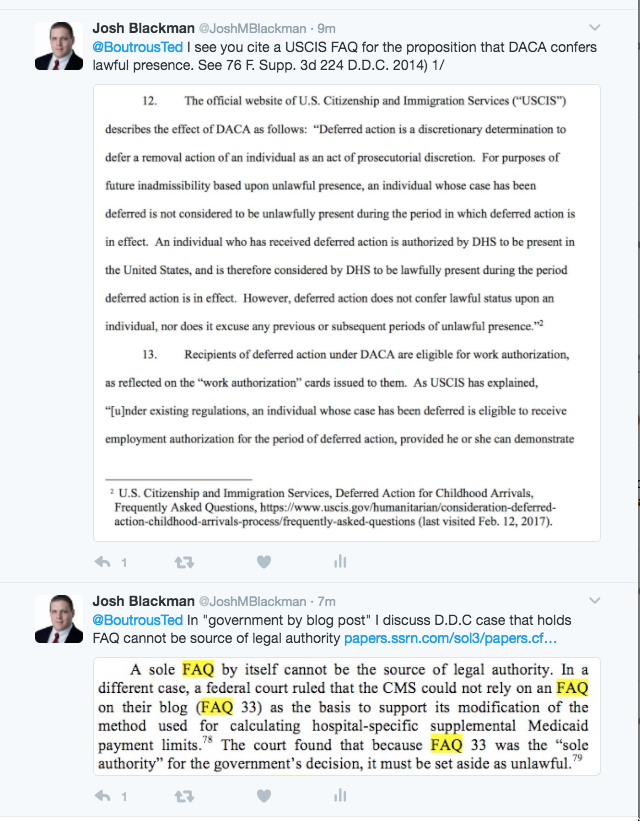Daniel Ramirez was twice granted deferred action and employment authorization under DACA. On February 10, he was rounded up and detained by ICE. In a statement, the government said he was detained because he was a “self-admitted gang member.”
Most recently, in May 2016, his renewal stated: “Unless terminated, this decision to defer removal action will remain in effect for 2 years from the date of this notice.” A petition for a writ of habeas corpus on Ramirez’s behalf was filed, which argues that the detention violates the Fifth Amendment because it “breaks the promises made to him under the well-established framework of the DACA program.” The petition is signed by, among others, Ted Boutrous, Larry Tribe, and Erwin Chemerinsky. (The latter two have certainly been busy of late!).
The petition asserts that DACA creates a “reasonable expectation” that recipients will not be deported during the “specified period,” which creates a constitutionally protected interest.
In establishing and continuously operating the DACA program under a well-defined framework and highly specific criteria, the federal government created a reasonable expectation among DACA recipients that they will be able to live and work in the United States for a specified period without being subject to arrest and deportation based on their immigration status. This reasonable expectation creates constitutionally-protected liberty and property interests for DACA recipients in the benefits they enjoy under DACA: being able to live and work in the United States without fear of deportation, so long as they satisfy DACA’s requirements. See, e.g., Perry v. Sindermann, 408 U.S. 593, 601–03 (1972) (reliance on informal policies and practices may establish a legitimate claim of entitlement to a constitutionally-protected interest); see also Texas v. United States, 809 F.3d 134, 174 (2015), affirmed by an equally divided court, 136 S. Ct. 2271 (2016) (explaining that “DACA involve[s] issuing benefits” to certain applicants). And these benefits are entitled to constitutional protections no matter how they may characterized by DHS. See, e.g., Newman v. Sathyavaglswaran, 287 F.3d 786, 797 (9th Cir. 2002) (“[T]he identification of property interests under constitutional law turns on the substance of the interest recognized, not the name given that interest by the state or other independent source.”) (internal quotations omitted). Accordingly, the federal government may not arbitrarily or capriciously deprive DACA recipients of these benefits, as they have here with Mr. Ramirez.
Specifically, the liberty interest is premised on the revocable promise made by President Obama’s administration:
Here, a legitimate claim of a protected property interest exists by virtue of the promise made by the United States government to Mr. Ramirez, and those similarly situated, to adhere to the strict framework set out by the DACA program and by virtue of granting him deferred action and work authorization. And, to the best of Mr. Ramirez’s knowledge, the federal government has kept that promise until now. Where, as here, an existing framework established by the government and individual’s reasonable expectations based on that framework give those individuals benefits that they would not otherwise have, a property right to those benefits exists.
Further, the petition asserts that prosecutorial discretion is in fact “constrained” by DACA.
While DACA is premised on the exercise of prosecutorial discretion, that discretion is necessarily limited and constrained by the rules and criteria that DACA is based on and by the decision to twice grant Mr. Ramirez deferred action and work authorization. These constraints on discretion further support Mr. Ramirez’s claim of a protected property interest here.
I have been making this point for more than two years. The argument that DACA was based on pure prosecutorial discretion was always a ruse. Why? Because the policy confers lawful presence, which was more than deferred action. Remarkably, and ironically, the petition favorably cites the 5th Circuit’s decision in U.S. v. Texas.
Indeed, “Deferred action . . . is much more than nonenforcement: It would affirmatively confer ‘lawful presence’ and associated benefits on a class of unlawfully present aliens. Though revocable, that change in designation would trigger (as we have already explained) eligibility for federal benefits—for example, under title II and XVIII of the Social Security Act—and state benefits—for example, driver’s licenses and unemployment insurance—that would not otherwise be available to illegal aliens.” See, e.g., Texas, 809 F.3d at 166.
I’ve seen it all. First Washington relied on the standing argument it once opposed to seek a nationwide injunction against Trump’s executive order. Now DACA supporters are relying on the exact characterization of DAPA that made it unlawful, to explain why DACA provides a judicially-enforceable right. Let me state that a different way. The 5th Circuit found that the conferral of lawful presence made the policy illegal. Now, the lawyers are relying on that conclusion to bootstrap a claim that DACA is now a constitutionally protected interest–albeit an illegal one.
To support the reliance interest, the petition cites DHS policy implementing DACA:
DHS policy provides that ICE officers who encounter individuals eligible for DACA “should immediately exercise their discretion, on an individual basis, in order to prevent low priority individuals from being placed in removal proceedings or removed from the United States.” See U.S. Dep’t of Homeland Security, Exercising Prosecutorial Discretion with Respect to Individuals Who Came to the United States as Children (June 12, 2015) (emphasis added). Consistent with this directive, Mr. Ramirez—who unquestionably meets all of the criteria for DACA—should not have been arrested or detained, and he should not be placed in removal proceedings.
But doesn’t that beg the question? Isn’t the essence of “discretion” that it does not needed to be exercised in every case? But again, we always knew discretion was a ruse. This was a blanket policy, that line officers were required to implement as a rubber stamp. So much so, the petition argues that it violates procedural due process to arrest a DACA recipient! Not exercising the “discretion” in the policy is unconstitutional.
Respondents, having knowledge that Mr. Ramirez met the criteria for DACA and was granted deferred action under the program, violated Mr. Ramirez’s procedural due process rights by arresting and detaining him.
The brief also relies DACA’s hotline bling.
As a result, hundreds of thousands of individuals applied for, and were granted, deferred action pursuant to DACA. And to Petitioner’s knowledge, the federal government has, until now, lived up to their promise. He is aware of no DACA beneficiary being subject to removal proceedings unless they had violated the criteria for receiving DACA by committing a crime. Indeed, DHS even maintains a toll-free “Law Enforcement Support Center hotline” open 24 hours a day and seven days a week, that it says DACA holders should call if they are arrested and “believe that, in light of this policy, they should not have been apprehended or placed into removal proceedings.” (https://my.uscis.gov/helpcenter/search?q=ICE&tag=tag_search.) In the past, DACA holders calling this number for this reason have been promptly released and not subject to removal. (Mr. Ramirez’s counsel called this hotline and was told that they could not help.)
In response, a magistrate judge ordered the government to answer several questions, one of which directly implicates DACA:
What is the basis for his detention, given that he has been granted deferred action under the Deferred Action for Childhood Arrivals program?
I expected this issue would arise but in a different context. Zach Price explained in an editorial that it may violate Due Process for DHS to use information provided by DACA-applicants in their removal proceedings. For a more thorough study, see Price’s article in the William & Mary Law Review, titled Reliance on Nonenforcement.
However, here we have a situation where a DACA-recipient may be subject to removal, but there is no indication the government is relying on any information provided during the application process.
There is one lingering issue here which was obviated by the Supreme Court’s 4-4 affirmance in United States v. Texas: DACA is illegal. DACA is even less defensible than DAPA, because at least with DAPA, the alien must have a close familial relationship with a U.S. citizen. For DACA, there is no need to have any relation with a U.S. Citizen. I discussed the legality of DACA in the Georgetown Law Journal Online:
First, DAPA beneficiaries at least have a close kinship with a citizen or LPR child. In contrast, DACA beneficiaries need not have any familial relationship with any citizen or lawful resident.119 Second, there have been active con- gressional attempts to defeat DACA, and the program remains controversial over two years after its institution, making it a weak basis for a claim of congressional acquies- cence in deferred action.120 This is especially true because DACA was based largely on a bill that was defeated in Congress and never became law.121
If in fact DACA is illegal, then the grant of deferred action was void ab abnitio, and no due process rights can attach.
I doubt this issue will be litigated, but it does afford an opportunity to revisit the constitutionality of DACA. I have no idea how the government will handle this case. President Trump, much to my surprise, has not terminated any of the deferred action grants. Though, I suspect that after learning that a DACA recipient is an accused gang member (who knows if it’s true?), there may be more of a push to revoke deferred action grants.
Update: Ted Boutrous weighs in on Twitter.

As my reply suggests, the 5th Circuit found that DAPA was illegal because of the grant of lawful presence without any discretion. If the same framework applies to DACA, then any right Ramirez can assert is void ab abnitio. Further, OLC only upheld DACA to the extent that there was discretion. If indeed there is no discretion, such that it violates due process to remove Mr. Ramirez, then DACA cannot be lawful. Finally, the DACA memo did not discuss lawful presence; the DAPA memo did. It is unclear why this concept even applies. In any event, let’s not forget that Solicitor General Verrilli said you could strike out the “lawful presence” portion of DAPA, and it would operate in the same fashion.
Update: In further exchanges, I note that the source of the authority for “lawful presence” is found in the USCIS FAQ. Literally, government by blog post. As I discuss in my article by that title, D.D.C. held that an FAQ cannot be the source of legal authority.

As for Ted’s promise to “deploy” me, I’ll pass.
